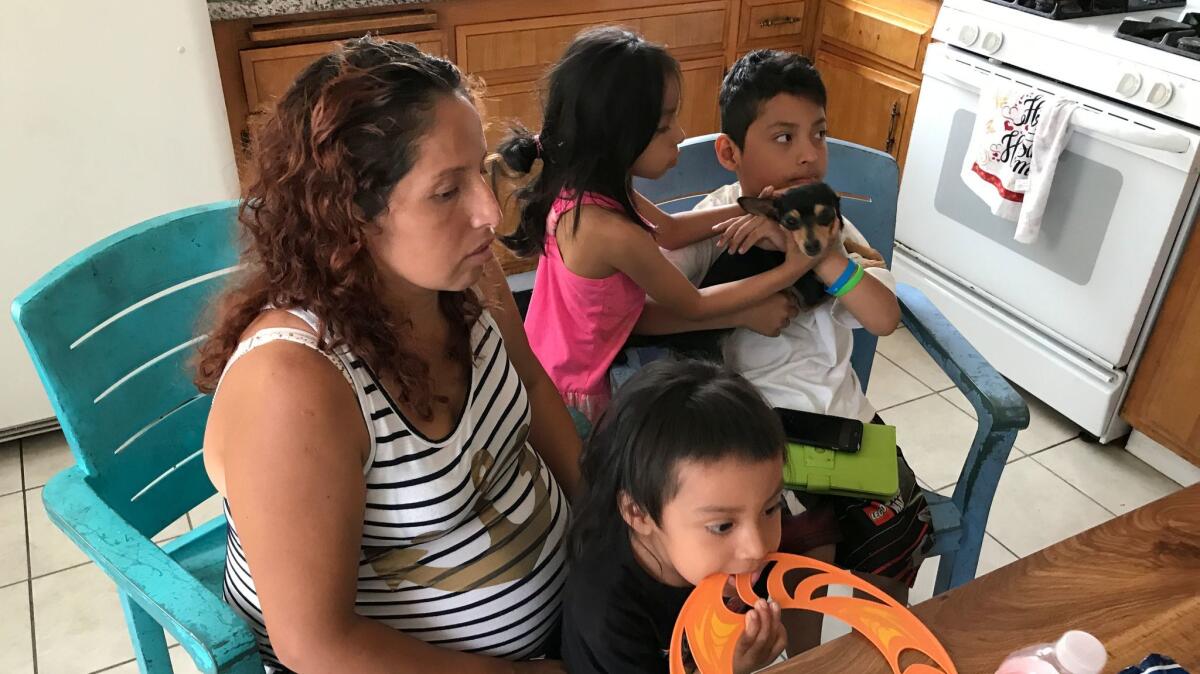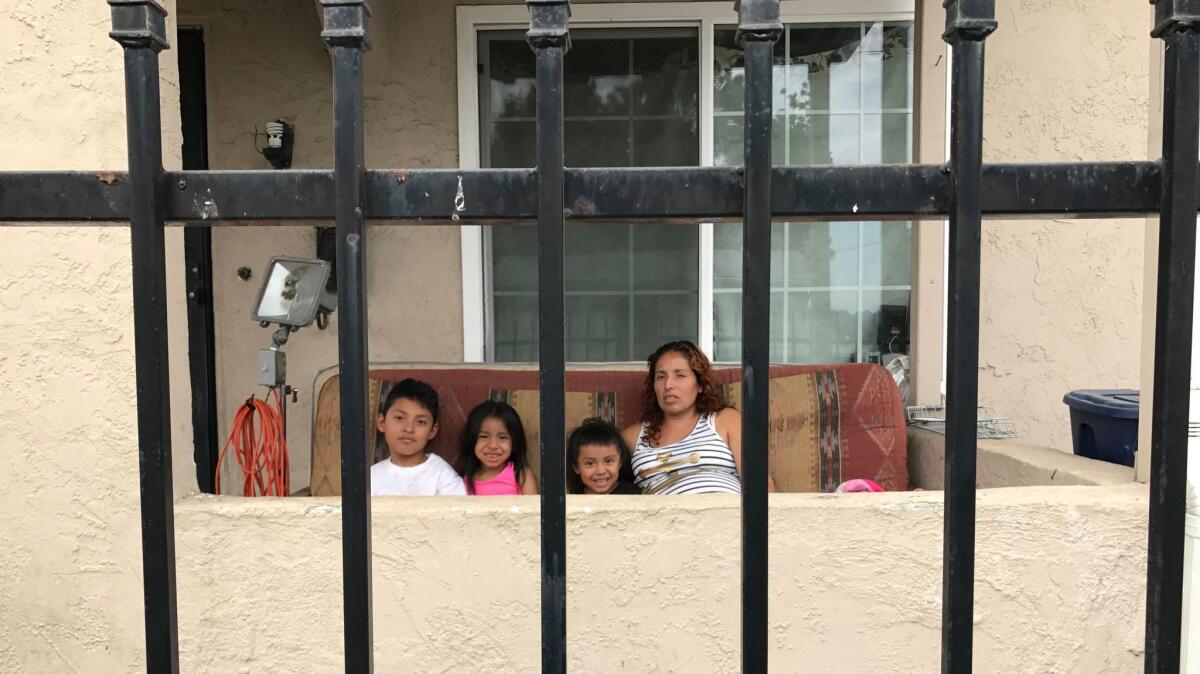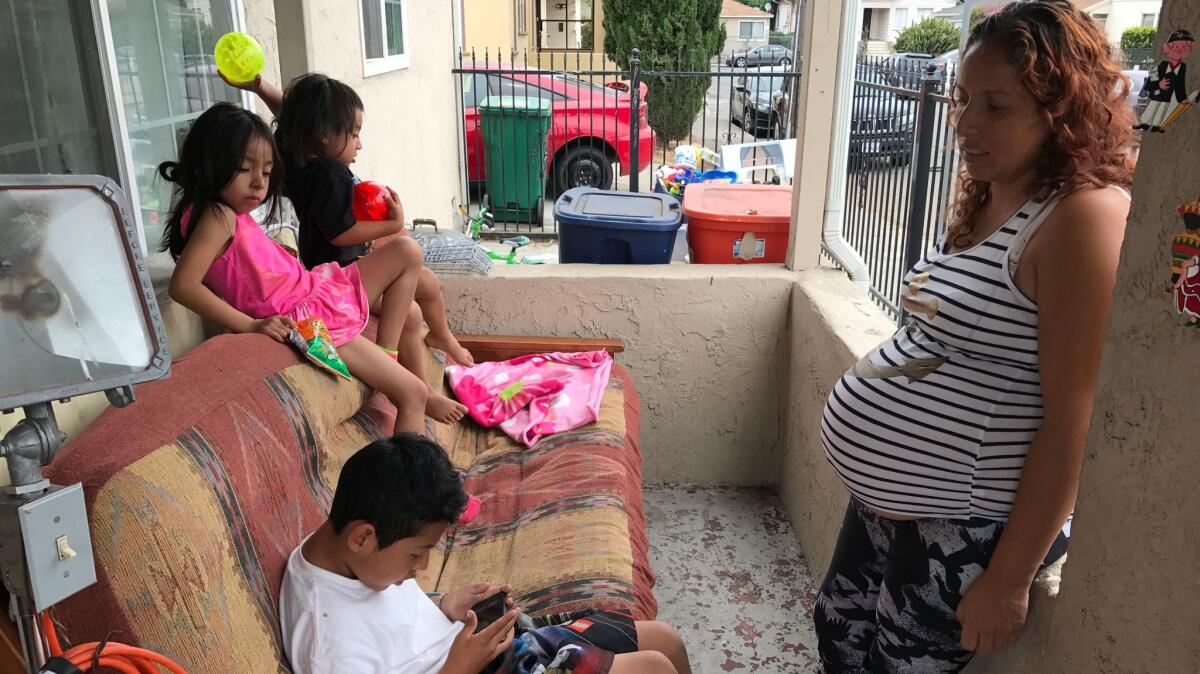California Journal: It’s a familiar calamity: Dad is in immigration jail, baby No. 4 is on the way, and Mom is struggling

- Share via
Reporting from Oakland — Yibi Heras was standing at the sink of her modest East Oakland home one early morning in February when she noticed some cars driving slowly past. The neighbors raise chickens and ducks, which sometimes escape the yard. She figured the cars were slowing down for animals in the road.
A few minutes later, she saw seven men standing in front of her house, and just after that, she heard a knock on a kitchen window next to her refrigerator. Her partner, Maguiber Ramos, had just gotten into bed, having returned around 4 a.m. from his job cleaning restaurants.
“I got scared,” Heras told me Thursday morning. “I thought it was a gang or robbers.”
We sat in her kitchen, as two of her three children scrambled around, looking for snacks, playing with their Chihuahua puppy Mena. Two alarmingly large turtles, Marta and Patricio, swam around a small fish tank next to the sink.
She woke Ramos, who thought the men were in the wrong place. They opened the kitchen door, and two men, who identified themselves as police, said Ramos’ car had been involved in a hit-and-run accident. Could he come outside?
Must be a mistake, Ramos told Heras. The car had been parked for three days. They beckoned him outside to show the registration.
“I told him, ‘If you didn’t do anything, why don’t you just go out and show them?’” Heras said.
“OK,” he told her, as he walked out the door. “I put my life in the hands of God.”
As soon as he showed the car’s registration, he was handcuffed. Their fourth child is due Sept. 6, and Heras has not seen Ramos since.

The men who came for Ramos were not police. They were officers from Immigration and Customs Enforcement. It’s not clear why they targeted him.
His attorney thinks it’s because Ramos had recently finished a 10-day community service stint after pleading guilty to a reckless driving charge stemming from a traffic stop in July 2016.
“We’ve noticed a lot more people getting picked up by ICE who have been released from criminal custody on pending charges — something minor like DUI or petty theft,” said Lisa Knox, his lawyer. She works at Centro Legal de la Raza, which provides services to low-income immigrants.
“They get released from county jail, and immigration will pick them up,” she said. “We suspect the Sheriff’s Department is sharing information with ICE about people — potential non-citizens — who are released from their custody.”
(In February, the East Bay Express reported that the Alameda County Sheriff’s Department routinely notifies ICE of release times for certain inmates. Knox suspects that ICE was alerted about Ramos even though his community service had been completed.)
Ramos’ only other brush with the law was in 2008, shortly after he had turned 18. He was arrested while sitting in a car with a friend in Santa Clara County, and pleaded guilty to being under the influence of cocaine. He was deported to Guatemala when Heras was pregnant with Kevin, their eldest child, who is 9, has cerebral palsy and cannot walk.
Two years later, in 2010, Ramos made his way back to Oakland. He reunited with Heras, and they had two more children, Gabriela, 5, and Christopher, 3.
For the last six months, Ramos, 27, who worked three jobs to support the family, has been held at Contra Costa County Jail’s West Detention Center. Because of his earlier deportation, he can be held for up to six months with no hearing. Knox told me he is scheduled to be in San Francisco immigration court on Aug. 24.
At that point, he will either be released (maybe unconditionally, maybe in exchange for bond, maybe with instructions to check in with immigration officials periodically, maybe with an ankle bracelet), or be kept in jail and allowed to request a bond hearing in another six months.
Eventually, he could be deported again to Guatemala, which he left, said Knox, to get away from violent gangs.
Knox is going to request that the government drop the case.
“It is not a good use of government resources to keep prosecuting this father of three — soon to be four — with a minimum criminal record who has done nothing but contribute to the community since he’s gotten here. It does not serve the public interest to tear that family apart.”
No, it really doesn’t. Scream all you like about illegal immigration, but honestly, removing a man like this from his family only costs taxpayers in the end. It’s short sighted and counter-productive.

As Heras, 32, and I were talking, with the help of a translator, Kevin crawled into the kitchen. His mother lifted him into a little wheelchair. He is a first-generation child of impoverished immigrants, a U.S. citizen just like his siblings, and so far, the only bilingual member of his family. How many of you have parents or grandparents who started out just like Kevin?
“You must feel exceptionally American,” I told him. I thought maybe that was too sophisticated a concept for a kid going into fourth grade, but he considered it for a moment.
“Ummm. I really don’t think about that,” he said. “It doesn’t matter which country you are from. It matters what kind of person you are.”
The problem with our unforgiving immigration system — particularly in the era of President Trump, but under President Obama as well — is that there is so little room for compassion, for the idea of paying one’s debt, being forgiven and moving on.
“In the immigration context,” Knox said, “you are your worst mistake, even a minor mistake or a youthful mistake.”
Snorting cocaine at 18, pleading guilty to reckless driving nine years later. Should a hard-working immigrant father of four American citizens be deported for that?
This is not who we are, people. We are better than this.
Get more of Robin Abcarian’s work and follow her on Twitter @AbcarianLAT
ALSO
A sailor in transition is rocked by President Trump’s anti-transgender tweets
A Bay Area town, criticized for building a water park during a historic drought, did not back down
A veteran pot farmer mourns the passing of a more paranoid, more profitable way of life
More to Read
Sign up for Essential California
The most important California stories and recommendations in your inbox every morning.
You may occasionally receive promotional content from the Los Angeles Times.











